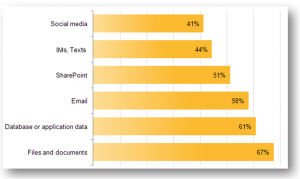Insights
3 MIN READ
Email Isn't eDiscovery Top Dog Any Longer, Recent Survey Finds
13 years ago
 Symantec today issued the findings of its second annual Information Retention and eDiscovery Survey, which examined how enterprises are coping with the tsunami of electronically stored information (ESI) that we see expanding by the minute. Perhaps counter intuitively, the survey of legal and IT personnel at 2,000 enterprises found that email is no longer the primary source of ESI companies produced in response to eDiscovery requests. In fact, email came in third place (58%) to files/documents (67%) and database/application data (61%). Marking a departure from the landscape as recently as a few years ago, the survey reveals that email does not axiomatically equal eDiscovery any longer.
Some may react incredulously to these results. For instance, noted eDiscovery expert Ralph Losey continues to stress the paramount importance of email: “In the world of employment litigation it is all about email and attachments and other informal communications. That is not to say databases aren't also sometimes important. They can be, especially in class actions. But, the focus of eDiscovery remains squarely on email.” While it’s hard to argue with Ralph, the real takeaway should be less about the relative descent of email’s importance, and more about the ascendency of other data types (including social media), which now have an unquestioned seat at the table.
The primary ramification is that organizations need to prepare for eDiscovery and governmental inquires by casting a wider ESI net, including social media, cloud data, instant messaging and structured data systems. Forward-thinking companies should map out where all ESI resides company-wide so that these important sources do not go unrecognized. Once these sources of potentially responsive ESI are accounted for, the right eDiscovery tools need to be deployed so that these disparate types of ESI can be defensibly collected and processed for review in a singular, efficient and auditable environment.
The survey also found that companies which employ best practices such as implementing information retention plans, automating the enforcement of legal holds and leveraging archiving tools instead of relying on backups, fare dramatically better when it comes to responding to eDiscovery requests. Companies in the survey with good information governance hygiene were:
Symantec today issued the findings of its second annual Information Retention and eDiscovery Survey, which examined how enterprises are coping with the tsunami of electronically stored information (ESI) that we see expanding by the minute. Perhaps counter intuitively, the survey of legal and IT personnel at 2,000 enterprises found that email is no longer the primary source of ESI companies produced in response to eDiscovery requests. In fact, email came in third place (58%) to files/documents (67%) and database/application data (61%). Marking a departure from the landscape as recently as a few years ago, the survey reveals that email does not axiomatically equal eDiscovery any longer.
Some may react incredulously to these results. For instance, noted eDiscovery expert Ralph Losey continues to stress the paramount importance of email: “In the world of employment litigation it is all about email and attachments and other informal communications. That is not to say databases aren't also sometimes important. They can be, especially in class actions. But, the focus of eDiscovery remains squarely on email.” While it’s hard to argue with Ralph, the real takeaway should be less about the relative descent of email’s importance, and more about the ascendency of other data types (including social media), which now have an unquestioned seat at the table.
The primary ramification is that organizations need to prepare for eDiscovery and governmental inquires by casting a wider ESI net, including social media, cloud data, instant messaging and structured data systems. Forward-thinking companies should map out where all ESI resides company-wide so that these important sources do not go unrecognized. Once these sources of potentially responsive ESI are accounted for, the right eDiscovery tools need to be deployed so that these disparate types of ESI can be defensibly collected and processed for review in a singular, efficient and auditable environment.
The survey also found that companies which employ best practices such as implementing information retention plans, automating the enforcement of legal holds and leveraging archiving tools instead of relying on backups, fare dramatically better when it comes to responding to eDiscovery requests. Companies in the survey with good information governance hygiene were:
- 81% more likely to have a formal retention plan in place
- 63% more likely to automate legal holds
- 50% more likely to use a formal archiving tool
- 78% less likely to be sanctioned
- 47% less likely to lead to a compromised legal position
- 45% less likely to disclose too much information
Published 13 years ago
Version 1.0Insights
The Veritas Insights blog brings the latest news and views about how to gain visibility into your data, storage, and backup infrastructure to take control of data associated risks.